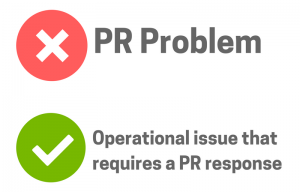“PR Problem” or Operational Issue?

All businesses have policies in place to guide their operations. Humans are the ones that live by and implement these policies. Choices are made, some good, some not so good. So when you see a headline and immediately scream, “I wouldn’t want to be their PR person right now,” or “Man, brand XYZ has a PR problem,” think about what might have happened right before the action occurred that resulted in the bad behavior that is now playing out in the press.
As a full-service agency that provides crisis communications and issues management services to clients, I can tell you there is always more to the story than what you will read in the paper or see in the Twitter stream.
Communications professionals must be at the table when decisions are being made. We can provide an objective opinion and guide discussions around the possible outcomes of those decisions.
Trust me; you want us there beforehand, because you are going to definitely need us after.
Case in point, the recent discussions around United Airlines “forcibly removing a passenger from the plane.” United Airlines, or all airlines for that matter, have policies and procedures in place that allow overbooking of their flights and what to do in the event that the overbooking will result in some passengers not being able to fly that flight. More often than not, compensation is offered, people take a later flight and all is well. In this particular case, UA had to get four employees to the destination and had to find seats for them. When no one volunteered, they randomly selected the passengers who would be asked to get off the flight.
These are operational guidelines. The result of the implementation of these guidelines is what has led to what is now being called a PR disaster for United Airlines. I’m not defending what they did. I’m not going to second-guess what led to what we all saw on social and in the mainstream news. I think the idea of overbooking a flight is ridiculous, always have.
My point is: what has been an accepted practice in the airline industry has been called into question in a very public way. Now it has become a PR problem. What United does now, what the other airlines do now remains to be seen. But I do hope they loop in the PR team.
For more thoughts, visit my Facebook page. I have some pretty smart PR colleagues that shared their options. I invite you to do the same.
Update: We continue to provide crisis communications to our clients with our first piece of advice being to have a crisis communications plan in place. As a Phoenix Public Relations agency, we have handled a number of different crisis situations for a variety of clients.

